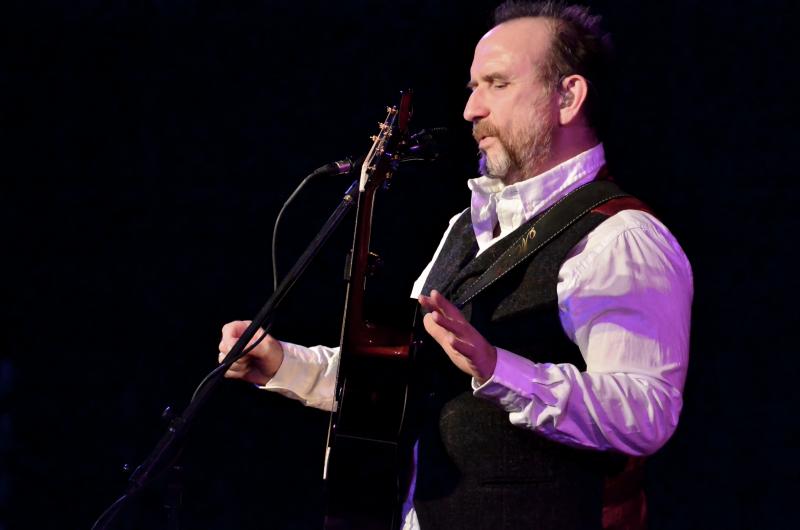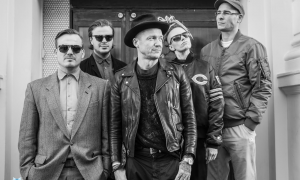Home » Jazz Articles » Live Review » Colin Hay at the Concert Hall at the New York Society fo...
Colin Hay at the Concert Hall at the New York Society for Ethical Culture

Concert Hall at the New York Society for Ethical Culture
New York, NY
March 18, 2017
Had Colin Hay not made his mark as a musician with Men At Work and as a solo performer, he'd surely have gained fame as a stand-up comedian. Hay has a wickedly funny sense of humor. This sense of the absurd was very much in evidence during his performance at the Concert Hall at the New York Society for Ethical Culture, Hay introduced one of his best loved songs with a story about Ringo Starr.
During the 2003 and 2008 All-Starr Band concert tours, Starr, he said, would tease him by saying, "Okay, Colin, time to play that song about that place that you're not from!" Hay would then launch into a spirited version of "Down Under" backed by the former Beatle and his band of celebrity musicians which during those tours included among others: Sheila E, Paul Carrack, John Waite, Billy Squier, Edgar Winter and Gary Wright.
Surprise! Colin Hay, who most people think of as the lead-singer of 1980's Australian hitmakers, Men At Work, isn't Australian. He is actually Scottish and was born in Kilwinning, North Ayrshire, Scotland in June of 1953. His father owned a music store. He and his family moved to Australia in 1967.
Men At Work, the band, however, was born in Australia. In 1978 Hay met Ron Strykert in Sydney and soon after the group was formed featuring: guitarist/keyboardist Hay, guitarist/bassist Strykert, drummer Jerry Speiser, bassist John Rees and multi-instrumentalist Greg Ham. In 1981, Men At Work released its debut album Business as Usual on Columbia Records.
The band released two number 1 singles in the United States: "Who Can It Be Now?" and "Down Under." The Business As Usual number 1 on the Billboard charts. Both "Down Under" and the Business as Usual album were also number 1 in Australia, New Zealand and United Kingdom.
The group's second album, Cargo (Columbia Records), was released in April 1983. It peaked at number 1 on the Australian charts, reached number 2 in New Zealand, and was a (for some) a disappointing number 3 on the U.S. Billboard Top 200. Cargo settled in at number 8 in the U.K. The single "Overkill" became an international Top 10 hit in the U.S., Canada, Ireland, Norway and Australia. Two other singles from Cargo ("Dr. Heckyll and Mr. Jive" and "It's a Mistake") also reached the Top 40.
Hay and the other band members took a break for most of the early part of 1984. When Men At Work reunited, tensions were high. Rees and Speiser were essentially let go. Hay, Ham and Strykert worked with session players to craft Two Hearts (Columbia Records, 1985). Two Hearts sold well (but not as well as its predecessors, peaking at number 16 in Australia and at number 50 in the states.
In 1986, Hay disbanded Men At Work. Since that time, Hay has worked as a solo artist releasing several major label and smaller label solo albums. His debut solo offering Looking for Jack was released by Columbia Records in 1987. Wayfaring Sons was released in 1990 on MCA Records. Ariola Records released Peaks & Valleys in 1992. In 1994 and 1998, FMA records released
In 2004, Hay contributed "I Just Don't Think I'll Ever Get Over You" to the Garden State soundtrack album. The movie and the CD were big hits and Hay was exposed to a new audience. In addition to his music career, Hay has also acted appearing in a number of movies and television shows. His appearances on Scrubs became legendary as he also performed some of his songs. In 2006, Hay provided his voice for one of the characters in the animated film The Wild. In August of 2015, the documentary Colin Hay: Waiting For My Real Life premiered to positive reviews at the Melbourne International Film Festival.
Hay who calls the United States home, moved to Los Angeles in 1982. He eventually settled in the Topanga region of that city and though he has not become a U.S. citizen, has lived there for almost 35 years.
On a wet and cool Sunday evening in Mid-March, Hay brought his one-man show to the Concert Hall at the New York Society for Ethical Culture, an 800-seat venue that also serves as a non-denominational house of worship . Appearing at 20 minutes after 8pm, Hay strolled out onto the sparse stage wearing a sports jacket over his shirt and vest. He immediately took the jacket off and hung it from a stray microphone stand, surveyed the audience, waved hello, said, "Sorry about the late start. There is no intermission. We'll just have to have the intermission at the start. I have played in some shitholes. This surely isn't one of them. I wonder what unethical studies are?"
The musical portion of the show began with "Come Tumbling Down," the first track from Fierce Mercy. The audience participated in the repetitive call and response "come tumbling down" lyrical portion of the song. The next song "Scattered In The Sand" with its poignant
"Somewhere along the river bend
Maybe we will meet again
Things we thought were there at our command
Scattered in the sand, scattered in the sand"
opening verse, was preceded by a story Hay told about his mother. He said, "She decided that she would stick around for her birthday and mine and as she put it, 'then I'm done.' A couple of days before she died we were watching a movie that I happened to be in and she looked at me and said, 'we had a good time, didn't we son.'"
Hay, who has a wickedly funny sense of humor, has had quite the interesting life. Interspersing tales both poignant and humorous between his songs, Hay had the audience on the edges of its seats as he wove tales that waxed philosophic while never failing to see the lighter side of life. The man is a natural storyteller. He told the story of his life with a self-deprecating grin and smile that immediately made everyone on attendance feel as though he was an old friend. He told the crowd that he "wasn't a drinking man when I was young. I liked the weed. Didn't drink alcohol. Though I took to it later. That's another story. I wrote all those songs for Men At Work when I was stoned. I'll never know if I could have done that straight." When he switched guitars, and had to take a moment to tune-up, he quipped, "I used to have guys that handed me freshly tuned guitars. First thing that goes."
Hay obviously misses his late father. He father, he said, owned a music store in Scotland. "One day," he said his dad called him over and "played me a new single by this new band called, The Beatles. I told him I wanted to be a Beatle. My Dad said, 'No, you can't be a Beatle. There's already four of them.'" After that he told his father's favorite joke. It was a fantastic yarn that got a roar of belly laughs from the crowd. He then played the instrumental "Good Night Romeo."
Toward the end of the evening, Hay switched guitars and paused for a moment while he set-up a stand with the music and words to a song that he obviously didn't regularly perform. He then launched into a powerful version of "Johnny B. Goode" in tribute to Chuck Berry who had died earlier that day.
The performance was everything that the mostly middle-aged audience could have wanted and expected...and more. ), Hay played with a passion and a joy that only those who truly love what they do can offer. In addition to the legendary Men at Work singles "Down Under" and "Who Can It Be Now," the troubadour also played a fantastic version of his original band's "Overkill." His performance touched on all facets of his solo career, offering "Maggie" about his first love, the girl he left behind in Scotland when the family moved to Australia. About the trip, he explained that "we went on a boat. It took about 4 weeks to get there. We arrived on the 13th of June 1967. Australia is about as far as you can go before you get to then end and have to turn around to go back again."
Other highlights of the evening included: "I Just Don't Think I'll Ever Get Over You," "A Thousand Million Reasons," "Secret Love," "Looking for Jack," "There's Water Over You," "I'm Going to Get You Stoned" and "Frozen Fields Of Snow."
As the night grew to a close Hay sang "Waiting For My Real Life to Begin," which many originally heard on an episode of Scrubs. The song has touched the lives of many and has also been featured in numerous other television shows including: Dawson's Creek, The Hills, The Cleaner, Judging Amy and Brothers & Sisters to name but a few. It's melancholy and sad, but also optimistic; its protagonist is sure that things are going to change and it that one "Mr. or Mrs. Right" will make it happen. In keeping with the theme of introspect, hope and optimism, Hay closed out the performance with "Next Year People" from the album of the same name.
Hay's performance was magical—one half was storytelling, the other half was pure acoustic singer-songwriter wit and charm. This performance was what VH1 had in mind when it created Storytellers. It's a shame that that network didn't do an episode featuring Colin Hay.
When last seen, a smiling Hay was in the lobby of the venue doing an impromptu meet and greet. The singer posed for pictures with his fans and signed CDs and LPs, while giving his fans who were lucky enough to stick around after the show ended another reason the remember this delightful and special evening.
Photo Credit: Christine Connallon
[Additional article contributions by Christine Connallon].
Tags
colin hay 2017
Colin Hay
Live Reviews
Mike Perciaccante
conqueroo
United States
New York
New York City
Ringo Starr
Sheila E
Edgar Winter
Gary Wright
The Beatles
Chuck Berry
Christine Connallon
PREVIOUS / NEXT
Support All About Jazz
 All About Jazz has been a pillar of jazz since 1995, championing it as an art form and, more importantly, supporting the musicians who make it. Our enduring commitment has made "AAJ" one of the most culturally important websites of its kind, read by hundreds of thousands of fans, musicians and industry figures every month.
All About Jazz has been a pillar of jazz since 1995, championing it as an art form and, more importantly, supporting the musicians who make it. Our enduring commitment has made "AAJ" one of the most culturally important websites of its kind, read by hundreds of thousands of fans, musicians and industry figures every month.





























